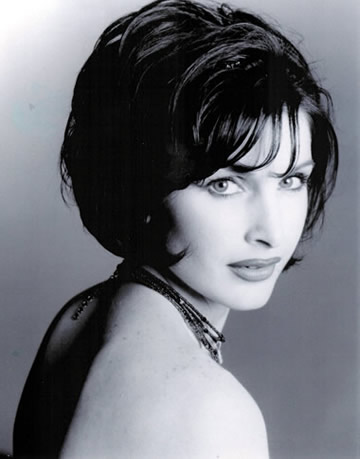
click image for artist's website | still under construction
Stephanie Adlington
no longer the other woman
exclusive interview
interview © Mark Fisher 2004
produced by © Russell W Elliot 2004
Images © Stephanie Adlington 2004
used with permission
Formatted for 800 x 600 or larger windows
Last updated: 09 January 2005
Stephanie Adlington made her name in the mid-nineties as Annie Haslam's replacement when Michael Dunford took his hand at reforming the 70s and 80s progressive rock band Renaissance. Originally from West Virginia, and musically gifted from a very early age, Stephanie completed a voice program at the Eastman School of Music in Rochester, NY. She went on to study voice and musical theatre at the Royal Academy of Music and married an English man in London.
While at the Academy, Stephanie was selected to perform a solo in one of the early workshops for Dunford's Scheherazade musical. She went on to record two albums with Michael entitled The Other Woman (1995), comprised of almost all new material, and Ocean Gypsy (1997), which reworked classic Renaissance tracks acoustically. Separated from her husband, Stephanie left England shortly after her second Renaissance album was completed to continue her musical career.
Since Renaissance, Stephanie has lived in New York, Los Angeles, Seattle, Nashville, and her childhood home of Grafton, West Virginia. While in Nashville she recorded a series of demos that represents the full spectrum of her interests and capabilities. Her lyrics are bare, emotional and, as we learn through the interview below, provide a very transparent view into her own heart.
Stephanie currently gives private voice lessons as well as teaches voice at West Virginia University and Fairmont State University. Her unique and thoughtful approach has already made her a highly sought after instructor. Her own creations remain her passion though and she is currently considering the possibilities of an independent album. She is down to earth and very much in control of her own destiny. She was a pleasure to sit and talk with and when at long last she releases an album, it will not be one that is easily forgettable. She is currently working on new material as well as constructing her own website.
Interview
I guess let's start at the beginning. How old do you think you were when you first thought that music may be something you'd like to do?
It was forever. My mom was recording me singing and humming before I could even talk. It's really interesting because when I go back and listen to those tapes I can hear myself harmonizing a lot. When I really got into music I was soprano so I had never really learned how to harmonize. Now, as I'm teaching kids, I'm learning that for children harmony seems to be a lot easier than melody. I have no idea why that is but I'm teaching some six and seven year olds now and it's much easier for them. That's what I was doing when I was two or three.
Was there a particular point in your life where you consciously decided to pursue music as a living?
It's just something that I've always done. It was kind of "my thing." I took dance classes and started taking voice lessons at West Virginia University when I was about 12 years old. I took voice lessons at the prep department which I'm now teaching in! (laughter) When I was auditioning for colleges I auditioned of Eastman, Julliard, Carnegie-Mellon, and Cincinnati but I never comprehended the pressure. I mean, I just went and did it. I never thought that if I flubbed it up on that day that I wouldn't get into college. I look back on that now and I'm really glad that I didn't know how much pressure it was! (laughter) I think I had just sort of a na´ve ambition. I just knew that that was what I was going to do and so I did it. I also attended Carnegie-Mellon's summer music program. I took singing, dance, and acting there.
While you were studying at the Royal Academy in London you hooked up with Michael Dunford of the band Renaissance, right?
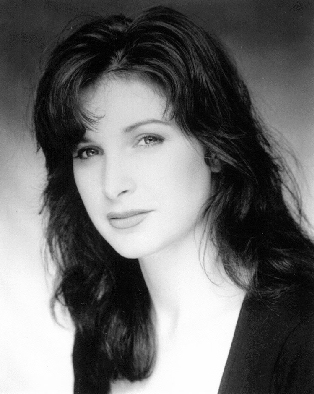 image © HTD Records Ltd 1996 |
I believe that he was writing a musical and he came to the Academy to record some demos. There was about an eight bar solo that I was asked to sing. After we recorded that he asked me to do an album with him. I definitely want to say that I'm very grateful for that experience. Being at the Academy I always felt like a singer for hire. I did classical and theatrical pieces and you always have a part that you are gearing yourself towards. Until then I had never really had an opportunity to explore my own voice. One of the things Renaissance did for me was help me find my own voice. I remember asking the producer of the album The Other Woman what he wanted me to do with a certain song and he asked me what I wanted to do with it. I didn't really know. I wondered how I could be this far along, and a voice major, and not know! That experience was critical for me to get to the point I am at now, which is writing, something I'd never done, and having my voice in a place where I always wanted it to be but never knew it could be.
Did you ever perform live with Renaissance?
No, I never did. I did The Other Woman with them and then a couple of years later I came back and recorded Ocean Gypsy with them. I didn't have a lot of creative input or anything; I just came in and recorded the vocals as well as the backing vocals. That was an interesting experience for me as well as I got to learn all about double and triple tracking. I didn't like it then and still don't! (laughs) It thickens the voice and I think that it takes away a lot of the nuisance of the voice. I argued with people all time about that! (laughs)To the best of my knowledge there was also no pitchshifting on either album. We just did it again and again until I got it right.
A lot of people believed that there was some sort of feud between yourself and original Renaissance vocalist Annie Haslam. How do you feel about that?
I'm flattered that it's such an issue really! (laughs) I totally respect Annie and I have no controversy with her whatsoever. What she did was great! When I came in I never based what I did upon what she was doing, I always went with how I felt and started from there. Since I have been removed from it all I have thought about the title The Other Woman. I honestly never thought about its possible meaning at the time. In my mind it was never anything but the title of the album. I never intentionally tried to copy what she did or anything like that. I totally respect her and wish her well!
So you started writing your own material after college and your experience in Renaissance?
Actually I really got into writing after my divorce. When I was in college I was just a singer, a singer for hire. When I was in college I always felt like you were either a singer OR a writer and I was singer. When I was going through my divorce, which was awful, I would take long walks and ended up having long conversations in with myself. You can only talk to friends so much before they can't really talk about it anymore, which is totally understandable. So I started to write things down, emotions, feelings, things like that and I think for the first time I had more than just a physical voice. I had a mental voice that I never really knew that I had in that sense. It was through writing these feelings down that I started kind of making songs out of them.
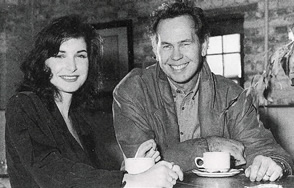 Stephanie Adlington and Michael Dunford during a break while making Ocean Gypsy image © HTD Records Ltd 1997 |
When I went to Nashville my teacher Judy Rodman, who has had a great career both as a solo artist and songwriter, asked why I hadn't made them into lyrics. She was very influential in me becoming who I am today. At first I wondered who would want to know about the things I wrote, but then I kind of realized that there may be other people going through the same kind of experiences that I did.
The way I see it now is that if I have gone through it and survived then someone else may be going through it and may need that. Even if it's a negative song I try my best to put some sort of positive spin on it because if you just write about negativity it makes you want to just go and jump off of a bridge.
People have negative issues in their lives but there has to be a positive way out of it so why make yourself feel even more depressed? That's kind of where I started writing songs from. In that sense I think that maybe divorce was the best thing that ever happened to me. It woke me up from being a young na´ve singer to asking myself what I think about things and how I feel about things. I realized that I did have thoughts of my own! (laughs) That's where songwriting really first came from for me.
After that I got really passionate about it because there are so many issues out there. "Secret Sin" is about Anorexia/Bulimia. My dear friend Jeni Shafer was going through that. She has since written a book of her memoirs about it called My Life With ED I believe. I started learning about it through seeing her go through it and I couldn't believe that so many people were going through it and yet, at the time, no one was talking about it. I knew that it was song. If you look back into the sixties artists like Lennon and Dylan were writing about the things going on in the world but no one is doing that now. I wanted it to be like that.
As a writer how do you approach your songs. Obviously you are a very trained singer. You know how to use and get the most out of your voice, which I'm sure is an asset, but on the other side of that there's a certain raw passion about music that so much training could hinder in my opinion. When you are writing do you ever feel like you are overtrained?
You know, I did in the beginning. What I've really found, and I'm only speaking about myself here, is that when I started writing and discovering who I was a as person my voice also started finding what it really is. It went from the theater style to me, if that makes any sense? My voice is a lot different on my own songs than it is on the Renaissance stuff. That wasn't something that I tried to do, it's just something that happened. My voice got a little deeper and a little raspier; I guess that I sort of forgot about a lot of my training. I got more into the text of the song, which was more my thing because I wasn't playing a character and I wasn't singing about someone else's life experience.
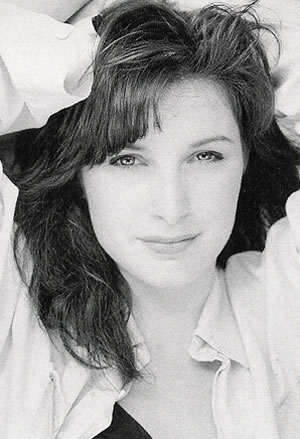 image © HTD Records Ltd 1997 |
I think that technically things went out the window at first. What's wonderful about technique though is that you do put it away and then pull out when you need it again. Like when I'm singing "Secret Sin" I pull it out when I want to hit the high notes. You do it properly instead of screaming it so that if you need to do it ten times then you can. That's what I really feel is great about my training. I used to feel that I should have left college sooner but now I think that things just happen in their own time.
How do you like to approach your lyrics? They seem very personal but a lot of artists still try to keep a safe distance from them and have definite boundaries.
Nothing is off limits. Again, I think if I have gone through something than probably someone else has as well. I feel like if I fluff over it they'll know and then why would they want to listen? So I just try to be as real and as honest as I can be about it. It's not always pretty but life isn't always pretty. Why fake it? I also wouldn't want to get so much imagery in there that people don't know what I'm talking about. That's thing I love about Bob Dylan. He is very poetic but he's very raw at the same time. I respect both of those things.
Did you find as you were recording demos in Nashville that you more na´ve about the industry and how it works than you thought you were?
Oh absolutely! You begin to wake up to it quickly and it's not a nice place. Once you wake up to that you realize that there is nothing you can do about it. You're either in the industry or not in it, there is no in between really. I had a co-publishing deal with Pat Boone while I was in Nashville that got me a deal with a small indie label. I made a few demos that got some attention in Seattle but the record deal that fell through. I just got so fed up with everything that I came back here to West Virginia.
Your song "Secret Sin" did well on the Washington Post's website. How did that come about?
That was through my boyfriend actually. He's a website designer and he knew about it because he had put another friend of ours, Chris Weaver, on it awhile ago. He suggested we put one of my songs on the site, I had never heard of it because I had been out of the area for fourteen years, and we put it on and it went really well. I had a lot of people re-connect with me through that. It was also a great opportunity to have other people here my music. It was a great experience.
So when you came back to West Virginia, what direction did you feel you wanted to go?
Well when I came back my original plan was to go to New York, I have a good friend there who teaches piano, and try to get a teaching gig. I had the unexpected opportunity to teach here in West Virginia though at West Virginia University and Fairmont State University so I decided to teach here for awhile. I started in May and now have over 40 students! (laughs) Teaching has really made my voice stronger. When you are teaching your voice gets strengthened beyond what you'd think because you are practicing all the time. It's amazing the difference in my voice that I have seen since I have been practicing this much! (laughs) Your voice is a muscle; it's like any other muscle, the more you use it the stronger it becomes.
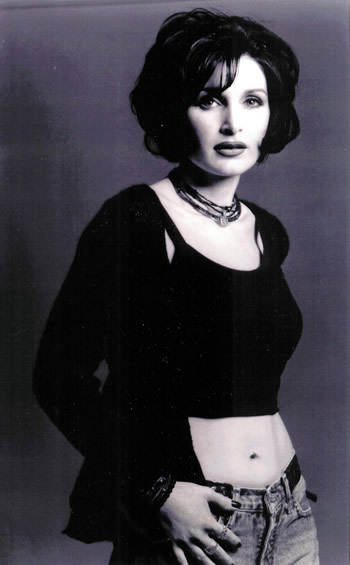 image © Stephanie Adlington 2004 |
How has your teaching experience been so far?
It's been good. It's a little frustrating at times and very tiring. I think that this is the hardest job I have ever done because you have a big responsibility to the kids, especially the younger ones. The college age students have chosen to do this but the young ones, the 9, 10, 11, 12 year olds are different. Right or wrong I feel like if they have a bad experience with me then they might end up not liking music. They might not want to sing again you know? So I really feel like it's up to me to keep it upbeat and that takes a lot of energy. After doing this 6, 7, 8 hours a day when you go home you're really exhausted! (laughs) I'm also learning a lot about myself through teaching.
With some demos under your belt now, what's your next step? Where do you feel that you fit into modern music?
I don't know really. Image-wise I don't really feel like I fit anywhere to be honest. If I tried to dress up like a slutty rockstar I'd feel completely uncomfortable and that would make the music sound uncomfortable but that's what's popular these days as far as image goes. Musically I suppose I fit best in the singer/songwriter genre. I really approach what I write from a lyrical standpoint. The melody comes from wherever the lyrics take me.
I feel like music is the biggest platform there is and if you're going to get attention from people then you should really say something worthwhile. Why should someone take three minutes out of their day to listen to crap? You should use that moment because it could be that moment that would spark something that could cause a positive change in someone's life or wake them up to some sort of awareness that they didn't have before. That's what life is all about, becoming aware and knowledgeable. Knowledge is power.
Thanks so much for your time Stephanie. Do you have any parting thoughts to leave the Musical Discoveries readers with?
I definitely want to thank everyone that has given me the time of day as an artist and even as a human being. I know that there are a lot of artists that I listen to regularly and I'm sure it's the same for other people. I really appreciate anyone who takes time out of their day to listen to my music or to read about me. I feel so much gratitude for that. I'd just ask that people stick with me. My career has been kind of sporadic so far but I hope that they'll support my music and stay with me and we'll see where it's all gonna go!
Return to website contents